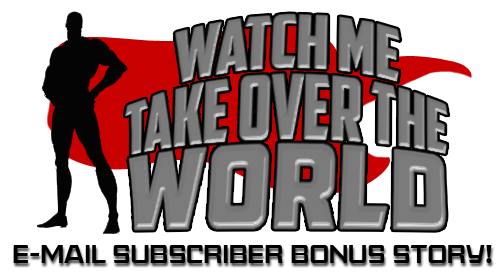Eric M. Hamilton's Blog
August 30, 2016
The Brilliance of Gene Wilder’s Wonka
The sad news has circulated that Gene Wilder passed away at the age of 83. He was my favorite. Seriously, just my favorite. He had so many iconic roles in some of terrific movies, but probably the role he is best known for, and will probably forever be remembered for is Willy Wonka.
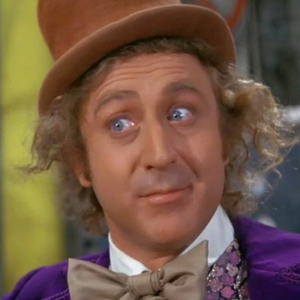 I love the original books by Roald Dahl, Charlie and the Chocolate Factory[image error] and Charlie and the Great Glass Elevator[image error]. These are classic children’s books that I might write about at some point in the future. They are deserving of their own spotlight. But as much as I love the books, I adore Willy Wonka and the Chocolate Factory[image error]. It is said that Roald Dahl was furious at the silver screen adaptation of his books, and I cannot fault an author feeling that way about his own creation. And I am often the snob who laments the book was better after watching a film adaptation. However, I really feel that this is one of the few times when the movie outshines the book in almost every way imaginable. (Another that comes to mind is The Wizard of Oz.) I have watched Willy Wonka more times than I can count from my youth up to now, and I love it more each time I watch it. It truly transcends the already incredible source material and becomes something that the book could never be.
I love the original books by Roald Dahl, Charlie and the Chocolate Factory[image error] and Charlie and the Great Glass Elevator[image error]. These are classic children’s books that I might write about at some point in the future. They are deserving of their own spotlight. But as much as I love the books, I adore Willy Wonka and the Chocolate Factory[image error]. It is said that Roald Dahl was furious at the silver screen adaptation of his books, and I cannot fault an author feeling that way about his own creation. And I am often the snob who laments the book was better after watching a film adaptation. However, I really feel that this is one of the few times when the movie outshines the book in almost every way imaginable. (Another that comes to mind is The Wizard of Oz.) I have watched Willy Wonka more times than I can count from my youth up to now, and I love it more each time I watch it. It truly transcends the already incredible source material and becomes something that the book could never be.
And 90% of the reason Willy Wonka and the Chocolate Factory is so good is because of the performance of Gene Wilder. In the role of the eccentric chocolate maker he perfectly balanced friendly and scary, intelligent and crazy, adult and child, unpredictable and predictable in his unpredictability. I am fully convinced that no other actor could have given the performance needed to lift this film from a simple children’s story into a bona fide classic. If I had the time and space, I could probably analyze each and every line of dialogue Wilder has in the film. Almost all of them are memorable and quotable. I want to mention two in particular, and relate it to writing, and show just how spectacularly brilliant Gene Wilder was.
This scene, and the song in particular is taken straight out of the book. In fact, I thought it was exactly the same until I started writing this article. (And from a quick Google search, it seems that most people assume it is). But the songs are different in the book and the movie. I own UK copies of most of Roald Dahl’s books. Unless I get confirmation otherwise, I’ll assume the movie added the extra lines.
From the Book
‘There’s no earthly way of knowing
Which direction they are going!
There’s no knowing where they’re rowing,
Or which way the river’s flowing!
Not a speck of light is showing,
So the danger must be growing,
For the rowers keep on rowing,
And they’re certainly not showing
Any signs that they are slowing . . .’
From the Movie
There’s no earthly way of knowing
Which direction we are going
There’s no knowing where we’re rowing
Or which way the river’s flowing
Is it raining?
Is it snowing?
Is a hurricane a-blowing?
Not a speck of light is showing
So the danger must be growing
Are the fires of hell a-glowing?
Is the grisly reaper mowing?
Yes, the danger must be growing
‘Cause the rowers keep on rowing
And they’re certainly not showing
Any signs that they are slowing!
In both the book and the movie this song is weird and out of place (like most things Willy Wonka does), but that’s almost all it is in the book. It is a poem that you read and you move on. In the movie, though. Oh, in the movie. Gene Wilder’s delivery of these lines is so mind-bogglingly creepy! Paired with the psychedelic visuals of the tunnel, this scene almost elevates this movie into the horror genre single-handedly. (You could almost make the case that it is horror; Willy Wonka knocking off children one by one.)
I remember being so confused and afraid of this scene when I was a child. I hated it. I didn’t want to watch it. I wanted to fast-forward. It felt so unnerving. But at some point in my twenties, this has become my favorite scene in the entire film for the exact same reason. It is so unnerving. Willy Wonka is a man that is supposed to unnerve you. He isn’t a joyous sprite to give you happiness and candy. He is a dangerous and unpredictable man. This scene perfectly encapsulates it, and it is only for Gene Wilder’s fantastic delivery.
Shifting from lines taken almost directly from the book and making them more than the book could ever be, we now come to a line that couldn’t possibly be left in any book. Any editor would strike them out immediately for being clichéd and sappy, even for a children’s book. But somehow Gene Wilder was somehow able to make the lines wonderful and endearing. It’s the final few lines of the movie. After Charlie, Grandpa Joe, and Willy Wonka ride in the glass elevator out of the factory and Willy Wonka informs Charlie that he’s making him his heir, Willy Wonka says these lines:
“But Charlie, don’t forget what happened to the man who suddenly got everything he always wanted.
He lived happily ever after.”
If I had read that at the end of the book, I would have groaned out loud. If this line was the last line of any other movie, spoken by anyone other than Gene Wilder, the last taste of the movie would have been sour. But somehow, Gene Wilder made it work. It is such a beautiful ending to a beautiful film.
Gene Wilder will be missed, but I am so glad that I have this movie (among others) to turn back to. He was truly something else. Rest in peace.
April 7, 2016
FREE GIVEAWAY!
ENTER TO WIN HERE!
March 2, 2016
Giving Away two Kindle eBooks!
Here is the Goodreads page of the book:
Franklin Pierce in Death of a Vice President
June 23, 2015
Coming Soon FOR FREE– Super-Villains
I have been overwhelmed with the amazingly positive response I’ve received from Franklin Pierce in Death of a Vice President, but I’m doing more than writing Presidential Fiction!
I love all sorts of genres, and I know there are a lot of you out there, too, that love to read different things. And while you anxiously wait for the second book in the Uncanny Presidents series, I have something completely different to hold you over.
Beginning on July 30, 2015, my e-mail subscribers will begin receiving FREE and EXCLUSIVE access to a serialized comedy story about Trevor Stephens, a down-on-his-luck barista who decides on a dare to follow his childhood dream of becoming a super-villain and taking over the world. The problem is that Trevor’s world is completely saturated with would-be super-heroes and villains EVERYWHERE. In order to take over the world, Trevor will have to take drastic steps to rise above the crowded super-villain market to ultimately take over the world.
Watch Me Take Over the World will be delivered in small, easily read pieces on a weekly basis to my e-mail subscribers. If you would like to read a funny and touching tale of world domination, then please subscribe to my email list. You will also receive information on all my upcoming releases, and you will also get access to subscriber-only deals as they become available! The time to join the list is now!
Subscribe to Eric’s Mailing List
* indicates required
Email Address *
First Name
Last Name
June 13, 2015
Why Write About Presidents
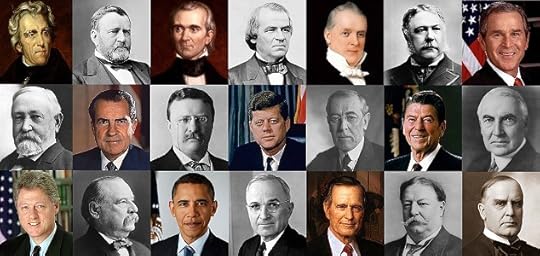 When I was in elementary school, I can remember these cumbersome children’s books, each about a different president, in the school library. I was fascinated by these men with funny faces, wigs and beards. I remember learning about George Washington and Abraham Lincoln, but there were all these other men left to a list in the appendix of the Social Studies book (the appendix was always more interesting to me than the actual textbook). And their look, the way they held themselves, the way they were portrayed in paintings and pictures, seemed to already speak volumes about what these men must have been like.
When I was in elementary school, I can remember these cumbersome children’s books, each about a different president, in the school library. I was fascinated by these men with funny faces, wigs and beards. I remember learning about George Washington and Abraham Lincoln, but there were all these other men left to a list in the appendix of the Social Studies book (the appendix was always more interesting to me than the actual textbook). And their look, the way they held themselves, the way they were portrayed in paintings and pictures, seemed to already speak volumes about what these men must have been like.
I’ve always liked to fill in the blanks of stories in my head. I wonder what a person’s story is. If I only hear one side of a phone conversation, my mind begins to fill in what the person on the other side is saying (and it’s usually more entertaining than what is actually being said). I wonder about what life actually was like for people in the past. History has always been a glorious playground in my mind. It is an infinite sandbox for me wander in and play with.
American history in particular is really interesting to me, not only because it is my heritage, but it is so relatively recent in the grand scheme of history. It is filled with legends and myths of our own making that proceed the Enlightenment, so we Americans have convinced ourselves our myths are more real than say English myths of King Arthur, or Babylonians and Gilgamesh. Our myths are not the stories of privilege and prestige (at least not starting out). Our heroes are heroes of the people. They make a name for themselves by what they do, not who they are. The typical American hero is the lone gunman (portrayed by Clint Eastwood) who usually does not have a name, and comes in and solves a problem for the oppressed people. While Westerns are not as popular as they used to be, the ideal American hero has not diminished in popularity. We Americans love the lone gunman (sometimes it’s a group of lone gunmans) in our stories, in our politics, in the way we choose to see the world. And in how we interpret our own history.
This is why we love stories about Washington, a general who won the Revolution (even though he led armies of thousands, and had significant help from others, we still think he won the Revolution), who came out of retirement to become president, and then left the presidency to return to farming. Or Lincoln who grew up in a log cabin, did his homework on a shovel (how did that work?), became a country lawyer known for his honesty, wit, and good ol’ country wisdom, and eventually became president in one of the most trying times of our country’s existence. These are true stories, but even the way we choose to relate them to ourselves and our children betrays what we see as truly valuable. They embody the American myth, and we continue to propagate it in the stories we tell of them.
This is not a criticism. Far from it. It’s just an observation.
We don’t tell these stories only about Presidents. We tell them about explorers, soldiers, artists, businessmen, activists. We’ll even insert it into the “ordinary” lives of the stay-at-home mom, or 9-5 worker. Their individual contributions, their tenacity in the face of overwhelming odds, their intentions to sacrifice to make a better life for others. We Americans love this. We tell stories about ourselves in this manner, and our ideal leaders follow this mold.
So, while Presidents are not the only figures in the American myth that follow this pattern, they are figures of the American ideal, which makes them (in our minds) bigger than ordinary men (King Arthur or Gilgamesh, anyone?). And we judge the legacy of individual Presidents oftentimes not on how closely they adhered to the strict legal definitions of the law, but how closely they adhered to our ideals as Americans.
This is what makes Franklin Pierce so interesting. He’s a president from history most of us know practically nothing about, but since he was a president, as Americans we have an innate sense about what he should have been. That gives a lot of room in telling a story about expectations and subverting expectations. Stories about U.S. Presidents become explorations about what it means to be a leader and an American. Can we really do it all ourselves? Are these people we idolize lone gunman (like we want to believe they were), or were they something more real?
Why Write About Presidents?
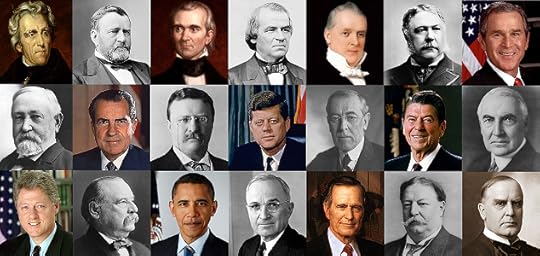
When I was in elementary school, I can remember these cumbersome children’s books, each about a different president, in the school library. I was fascinated by these men with funny faces, wigs and beards. I remember learning about George Washington and Abraham Lincoln, but there were all these other men left to a list in the appendix of the Social Studies book (the appendix was always more interesting to me than the actual textbook). And their look, the way they held themselves, the way they were portrayed in paintings and pictures, seemed to already speak volumes about what these men must have been like.
I’ve always liked to fill in the blanks of stories in my head. I wonder what a person’s story is. If I only hear one side of a phone conversation, my mind begins to fill in what the person on the other side is saying (and it’s usually more entertaining than what is actually being said). I wonder about what life actually was like for people in the past. History has always been a glorious playground in my mind. It is an infinite sandbox for me wander in and play with.
American history in particular is really interesting to me, not only because it is my heritage, but it is so relatively recent in the grand scheme of history. It is filled with legends and myths of our own making that proceed the Enlightenment, so we Americans have convinced ourselves our myths are more real than say English myths of King Arthur, or Babylonians and Gilgamesh. Our myths are not the stories of privilege and prestige (at least not starting out). Our heroes are heroes of the people. They make a name for themselves by what they do, not who they are. The typical American hero is the lone gunman (portrayed by Clint Eastwood) who usually does not have a name, and comes in and solves a problem for the oppressed people. While Westerns are not as popular as they used to be, the ideal American hero has not diminished in popularity. We Americans love the lone gunman (sometimes it’s a group of lone gunmans) in our stories, in our politics, in the way we choose to see the world. And in how we interpret our own history.
This is why we love stories about Washington, a general who won the Revolution (even though he led armies of thousands, and had significant help from others, we still think he won the Revolution), who came out of retirement to become president, and then left the presidency to return to farming. Or Lincoln who grew up in a log cabin, did his homework on a shovel (how did that work?), became a country lawyer known for his honesty, wit, and good ol’ country wisdom, and eventually became president in one of the most trying times of our country’s existence. These are true stories, but even the way we choose to relate them to ourselves and our children betrays what we see as truly valuable. They embody the American myth, and we continue to propagate it in the stories we tell of them.
This is not a criticism. Far from it. It’s just an observation.
We don’t tell these stories only about Presidents. We tell them about explorers, soldiers, artists, businessmen, activists. We’ll even insert it into the “ordinary” lives of the stay-at-home mom, or 9-5 worker. Their individual contributions, their tenacity in the face of overwhelming odds, their intentions to sacrifice to make a better life for others. We Americans love this. We tell stories about ourselves in this manner, and our ideal leaders follow this mold.
So, while Presidents are not the only figures in the American myth that follow this pattern, they are figures of the American ideal, which makes them (in our minds) bigger than ordinary men (King Arthur or Gilgamesh, anyone?). And we judge the legacy of individual Presidents oftentimes not on how closely they adhered to the strict legal definitions of the law, but how closely they adhered to our ideals as Americans.
This is what makes Franklin Pierce so interesting. He’s a president from history most of us know practically nothing about, but since he was a president, as Americans we have an innate sense about what he should have been. That gives a lot of room in telling a story about expectations and subverting expectations. Stories about U.S. Presidents become explorations about what it means to be a leader and an American. Can we really do it all ourselves? Are these people we idolize lone gunman (like we want to believe they were), or were they something more real?
June 12, 2015
Pierce in Print
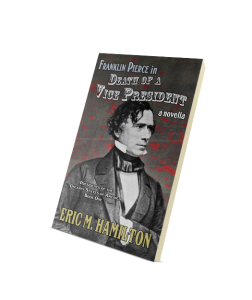 Franklin Pierce in Death of a Vice President has finally been released in print! You can grab yours here:
Franklin Pierce in Death of a Vice President has finally been released in print! You can grab yours here:
Or you can still order autographed copies directly from me if you’re in the U.S. Follow this link to the PayPal button.
Thank you all for your patience and support! If you do pick up a copy of Death of a Vice President please consider reviewing it where you bought it, or review it on Goodreads! Reviews help independent writers spread the word on their products.
Thank you again!
June 6, 2015
Death of a Vice President Released Digitally!!

Franklin Pierce in Death of a Vice President has been released on all e-book formats, and it is currently being offered at an early bird price of $0.99 (regular will be $2.99).
Here are the links to the various places you can get the digital version now!
Amazon | Kobo | Amazon UK | Gumroad | Smashwords
There will eventually be a Barnes & Noble link, but they are giving me more trouble setting up than the others. I will let you know as soon as that is available, as well. If you don’t see your favorite online book retailer, try searching for “Franklin Pierce in Death of a Vice President.” Smashwords is supposed to catch all those other bookstores like Apple’s iBookstore, if that is your preference.
It should also be available in all other country-specific Amazon sites, so just search for it in whichever store is best for you.

THE PRINT EDITION IS COMING SOON!
I am just waiting on the postal service at this moment to send the final proof, and as long as everything seems okay, I will approve the print version within the next week or two.
I have had many requests for autographed copies, so I would like to make that available. You can order an autographed copy of the print book from me by following the PayPal link below. If you do, you can also select to have a free copy of the e-book, which I will email to you within 24 hours of making your order. (U.S. orders only for the PayPal button, please).
Autographed Copy of Franklin Pierce Book
Additional e-book at no cost?
YesNo

June 5, 2015
Exciting Things Coming Very Soon!
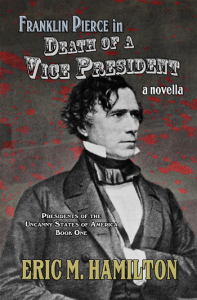
YOU will soon be able to hold this in your physical hands, or figuratively in your digital cyber-cloud-thing!
We are getting REALLY close to the release of Franklin Pierce in Death of a Vice President. Like in less than a week close!
So I wanted to give an update on the state of the site, and how things are coming with the book!
On the Book
A few things have changed since my last blog post. The series of presidential sci-fi/fantasy match-ups is going to be titled Presidents of the Uncanny States of America, and the FIRST SEASON will consist of five novella-length books. The first of which is the one I mentioned earlier.
Speaking of which, IT’S DONE! I am in the final stages of approving proofs, and getting all the e-book file formatting done. By early next week, the e-book should be available at your favorite (and not-so-favorite) online bookstores, and the print version should be available from Amazon, within two weeks (but I’m aiming for even sooner. It’s all dependent on the mail!)
On What’s Coming Next
So, this is not the end of the line by any means! There are still FOUR MORE books coming in Presidents of the Uncanny States of America (the next you can get a sneak peek of here). PLUS– I’m going to be releasing audiobooks featuring my soothing voice in the future, too!
PLUS!! I have more books coming, too! If U.S. Presidents fighting assassins or traveling through time isn’t your thing (who am I to judge?), I have a more traditional fantasy coming, which I will tell you more about in the future, but here’s a quick synopsis.
Wrong Unicorn is a story that explores what happens when the bully kid goes on the amazing fantastical adventure, and the good kid is left with the disappointing fantasy left-overs. It’s like if that bratty girl got Willy Wonka’s chocolate factory instead of Charlie, except it’s not chocolate, it’s unicorns… Or it’s like if Dorothy was bullied by some Kansas red-neck, and HE got to travel to Oz… something like that. Anyway, more to come later!
Other Things!!!
There is a lot of awesome things coming, and I want you to stay informed, as well as entertained! So, if you want to get up-to-date info on the releases of my upcoming books, and participate in awesome subscriber-specials (to be announced later, too!), the best way would be to join my newsletter email list!
Subscribe to the list
* indicates required
Email Address *
First Name
Last Name
That’s all I have for now! Check back real soon for the release of Franklin Pierce in Death of a Vice President, or subscribe so you don’t miss it!
February 12, 2015
Coming to an E-book Near You!
I guess this represents the soft-launch of my new website. I am still working on a few additional features that I will roll out in the coming months, but the important part is that there is a base to work on.
I’m making the jump into full-time writing, and I have a rather ambitious project I am working on that I want to share with everyone.
 Tales of the American Presidents is an upcoming fantasy series of five short stories followed by a full-novel. Each story features a President of the United States with a unique fantasy or sci-fi twist. The stories are written to be accessible to any reader regardless of their own historical knowledge, but should be especially enjoyable to the historical-junkie, with plenty of tidbits and easter eggs hidden throughout.
Tales of the American Presidents is an upcoming fantasy series of five short stories followed by a full-novel. Each story features a President of the United States with a unique fantasy or sci-fi twist. The stories are written to be accessible to any reader regardless of their own historical knowledge, but should be especially enjoyable to the historical-junkie, with plenty of tidbits and easter eggs hidden throughout.
The first story in the series, coming soon is based on the fourteenth, and little known, president, Franklin Pierce.
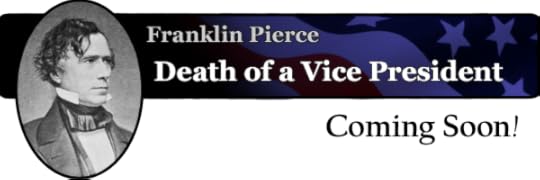
In real life, Franklin Pierce was assailed by personal tragedy throughout his life and even a few months before taking office. This story takes place only a month after Pierce has taken office in 1853 in the midst of depression. His vice president, William King, arrives in the middle of the night having uncovered an assassination plot against the highest levels of the U.S. government. Death of a Vice President is inspired by the gothic horror literature of the nineteenth century, in particular that of Edgar Allen Poe.
The plan is to release this story in all e-book formats in March or April of this year. The remaining four short stories and novel will follow shortly after. I am not quite ready to reveal the stories yet, but I will leave you with these teasers. Each story will feature a particular president with a unique fantasy or sci-fi twist. Perhaps you can guess the presidents from their profiles?





I will have more announcements to come later!

